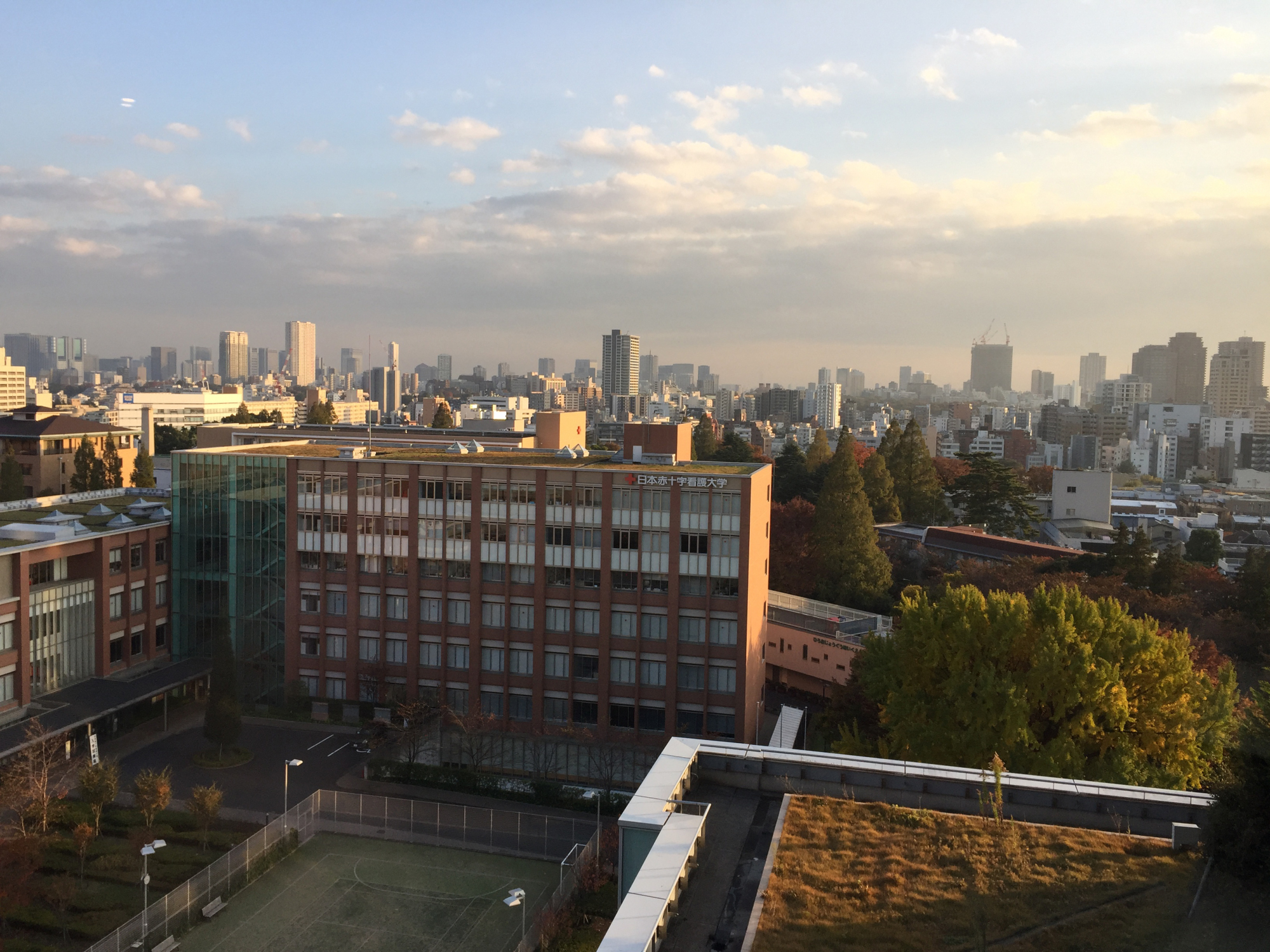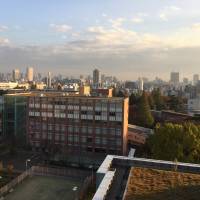The time had come. I checked into the Japan Red Cross Medical Center in central Tokyo's Shibuya Ward on Nov. 7 and was shown to the eighth floor, where my airy private room has a shower and a sofa beneath the big picture window and a wonderful, multi-adjustable bed I'd love to have at home. Add a minibar and it would be a splendid hotel room.
From this hospital's hilltop vantage I can see the classy suburb of Hiroo and the Akasaka business and hotel district, with a glimpse of Tokyo Tower beyond. Looking down, I notice most nearby roofs are planted with grass, shrubs and even trees to provide insulation in winter and cooling in summer — while also helping to offset the heat-island effect caused by all the city's concrete and asphalt.
In a silly, self-congratulatory way, that seems a small endorsement of my long environmental career in Japan, as I have been advocating green roofs here for more than 30 years.
However, Nov. 7 was a fateful day for me as I wandered around the big, 700-bed hospital undergoing final tests. Then eventually 10 p.m. came around — the cutoff time for all liquids. How I could have done with a whisky!
I drew back the curtain in my room so I could see the lights and let dawn awaken me. At 5:30 a.m. I got up, showered and donned a hospital robe. Then I waited.
Finally, at 8 a.m. on what most of the world probably remembers as the U.S. election day, they came for me and, accompanied by my wife and my manager, I went down to the fourth floor where I was led into a wing with brightly lit operating theaters off to the sides.
I was too scared to even make a bolt for it — and anyway, my surgeon and his team were all kitted up waiting for me. I'd been dreading that moment since being diagnosed with Stage 2 colon cancer five months before.
I've led a full, active, adventurous life, and I've always been a pretty tough and fearless guy. Just then, though, I felt helpless and really frightened.
How often have you heard about someone's "long battle with cancer"? Well, it isn't like that, at least not for me. Battles, or at least fights and skirmishes, I have dealt with, but it's the medical professionals who deal with the cancer attacking your body — in my case a revolting thing like a miniature abalone just inside my rectum; something not even alien, but part of myself.
Soon, I was laid on a sheeted slab, where a mask was placed over my nose and mouth and somebody said, "Take deep breaths ..." One, two, or at the most three breaths later my consciousness was no longer of this world.
I came round 24 hours later, hearing a young doctor talking to me and with the faces of my wife and manager coming into focus. I had one plastic tube going through my mouth into my lungs and another going into my stomach. My throat ached and I desperately wanted a sip of cold water. None was forthcoming.
The operation had lasted for 14 hours and it must have been worrying for those waiting — and exhausting for the medics.
Altogether, no water passed my lips for four days and nights. That was hell. My body felt to be on the edge of deep and aching pain.
After two days, I was wheeled by gurney back to my room with its fantastic view — which was when a hitherto unexperienced series of adventures began.
Apart from ethyl alcohol and caffeine, I've never "done" mood-altering drugs. Now powerful painkillers, as well as sugary fluids and antibiotics, were dripping into my veins through needles on the end of tubes attached to plastic bags hanging from a big metal stand beside the bed.
I asked my wife to draw back the curtains so I could gaze out at the city. As darkness began falling, a huge flock of birds appeared, surely numbering 1,000 or 10,000 times more than the massive throngs of starlings I've seen before in Montreal, Vancouver or London — and once recently roosting noisily in trees outside the station in Sendai, Miyagi Prefecture, as pedestrians walked by obliviously massaging their so-called smartphones.
Wheeling and soaring, this flock formed huge clumps one moment and fluid shapes the next. Then I noticed white specks among the birds and wondered if lights were reflecting off their pale bellies. However, when I called a nurse to come and look, she said, "It's only clouds." Though that aerial spectacular was real to me, it was just the start of a series of hallucinations that kept me entertained and occupied all the while I was being drip-fed those painkillers.
At night, three robots six to eight storeys high appeared standing in a row among the tall buildings. The middle one was a friendly chap and I'd swear he winked and waved as they watched over me till dawn. I tried to point them out to my wife and manager, even to a couple of visitors, but I was the only one able to see them.
Meanwhile, when I closed my eyes in broad daylight, that man-high metal stand beside the bed became a tall, thin monk in a hooded gray habit. Using my inner eye I could peer into the shadow of the cowl and into his brooding face with black, deep-set eyes, a thin nose hooked like an eagle's beak, and a short-cropped black beard. Not a word did he utter; he just stared down at me even when I tried to engage him in conversation. Even so, I wasn't scared because I knew that if I opened my eyes he'd change into a metal stand.
For most of my life, ever since I rejected the Church of England without telling anyone, I've been happily pagan, accepting almost all religions so long as they threaten noone. However, after that major operation I felt the urge to talk about matters spiritual with that monkish presence. Yet still his thin lips stayed sealed.
By day the hallucinations also caused the hospital floor to ripple like a calm pond stroked by a catspaw of breeze — while amazing patterns and dramas far more engrossing than the afternoon TV's played out on my room's white walls.
All the time, I knew they were illusions that would vanish if I opened my eyes. Unlike most dreams though, I remember everything. Wow — what a trip!
Now, with my weight down to 87 kilograms from 97 kilograms on Nov. 7, I find walking and climbing stairs is far easier than before. And, when I sit writing in this floor's bright lounge with its fabulous views of Mount Fuji on fine mornings, I'm so happy to be free of all those drips — though until my gut heals in about a month, I'm fitted with a stoma and a colostomy bag that should be removed then in a far simpler operation.
It was wonderful, too, when my doctors told me no trace of cancer was found in any tissues around the monstrous growth. So once all this is behind me (no pun intended), I look forward to resuming farting and sitting down for hearty poos. Excuse the language, but if you've ever been deprived of such-like, you'll know just where I'm coming from.
Over the past few years, I've lost many close family and friends to cancer, though this time I seem to have got away with it. Soon I'll be going home to Kurohime in northern Nagano Prefecture, where I'll fuss my cats and stroke our horses. I might even try a single-malt whisky.
This is one of the most challenging adventures of my life. I would not have come through it without the love and support of my family and my manager, nor without the calm care of doctors, nurses and others — among whom the nurses in particular have been so kind. Thank you one and all.




